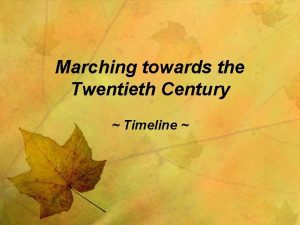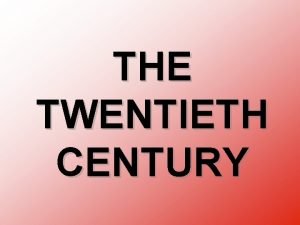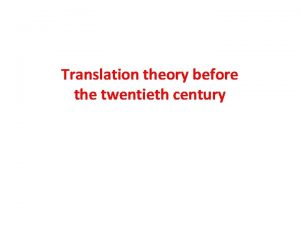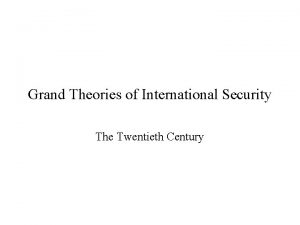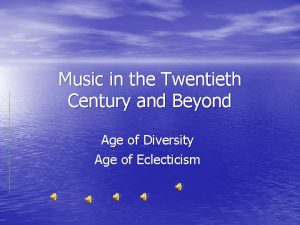The Twentieth Century A Century of Change for















- Slides: 15

The Twentieth Century A Century of Change for Great Britain

Political and Social Changes in Early Twentieth Century Britain • Queen Victoria died in 1901. Her death signaled the end of the Victorian era and of Britain’s moral and economic world dominance. • Major British colonies—Canada, Australia, South Africa, and New Zealand—obtained independence. • Social reforms, including the Labour party and socialism, became increasingly popular.

The Emergence of New Ideas The twentieth century embraced new ideas about science, economics, and psychology. • Science • Charles Darwin wrote Origin of Species (1859), which espoused natural selection—the idea that the animal species that successfully adapt to their environments survive and reproduce. • Others transformed Darwin’s ideas into social Darwinism, which claimed that in society, as in nature, only the fittest should survive and reproduce.

The Emergence of New Ideas The twentieth century embraced new ideas about science, economics, and psychology. • Economics • Karl Marx wrote Das Kapital (1867). Marx argued • that the capitalist system of ownership causes economic injustices • that private property should be abolished • that workers should own the means of production

The Emergence of New Ideas The twentieth century embraced new ideas about science, economics, and psychology. • Psychology • Sigmund Freud wrote The Interpretation of Dreams (1900). Freud • claimed new motives, evident in dreams, for human behavior • proposed that humans were driven by the irrational, sexually charged realm of the unconscious—not the rational, conscious mind

World War I (1914– 1918) World War I, also known as the Great War, was caused by a breakdown of the balance of power in Europe. • Trench warfare led to millions of casualties. An entire generation of young Englishmen was killed. • The British • became disillusioned about the individual’s relation to society • developed cynical attitudes toward government and such values as national honor and glory

Experimentation in Artists challenged traditional values of beauty and order, opening new avenues of expression. • Musicians experimented with strong rhythms and dissonant harmonies. Steve Shock • Painters experimented with bold new use of line and color.

Experimentation in Drama and Literature • Dramatists experimented with subject matter and the idea of the “hero. ” • Novelists experimented with new literary methods. • With respect to content, writers often • glorified the senses • focused on introspection, not on the concerns of society • With respect to form, writers sometimes • rejected chronological order • shifted points of view

Rise of Dictatorships Economic depression after WWI fostered the rise of dictators in Italy, Germany, and Russia. • In Italy, Benito Mussolini was in power from 1922– 1943. • In Germany, Adolf Hitler was in power from 1933– 1945. • In Russia, Joseph Stalin was in power from 1941– 1953.

World War II (1939– 1945) World War II was the bloodiest and largest war in history. • The war between the Axis powers and the Allies • caused millions of deaths worldwide, including the deaths of six million Jews in Europe • was the first and only conflict in which atomic bombs were used

British Literature after World War II After World War II, a group of young novelists and playwrights known as the Angry Young Men emerged. The Angry Young Men criticized • the pretensions of intellectuals • the bland lives of the newly prosperous middle class • what they viewed as institutional, conventional, and conforming aspects of society

The End of the British Empire • Loss of India (1947) • Because most of Britain’s resources were devoted to rebuilding its economy after World War II, Britain lost most of its colonies, including India. • Peace in Ireland (1998) • After thirty years of violent conflict in Northern Ireland, a peace agreement was signed and the first all-Ireland election since 1918 was held. However, in 2000, rule over Northern Ireland was restored to Britain because of instability.

British Literature Today, British literature • is “worldwide” because it includes works by many writers from Britain’s former dependencies • has varied themes, such as • political concerns • human suffering • problems of personal identity • effects of cultural domination and racism

What Have You Learned? 1. In the twentieth century, artists were most concerned with a. following the past traditions c. finding beauty in nature b. experimenting with new forms d. exposing social ills 2. The twentieth century embraced new ideas in a. science c. psychology b. economics d. all of the above 3. The British Empire ended when _____________. a. Britain lost most of its colonies c. World War I started b. World War II started d. Queen Victoria died

The End
 Parker v twentieth century fox
Parker v twentieth century fox Parker v twentieth century fox
Parker v twentieth century fox Twentieth sunday after trinity
Twentieth sunday after trinity Jiddisch
Jiddisch Typiska drag för en novell
Typiska drag för en novell Frgar
Frgar Autokratiskt ledarskap
Autokratiskt ledarskap Humanitr
Humanitr Blomman för dagen drog
Blomman för dagen drog Rita perspektiv
Rita perspektiv Redogör för vad psykologi är
Redogör för vad psykologi är Lek med geometriska former
Lek med geometriska former Bästa kameran för astrofoto
Bästa kameran för astrofoto En lathund för arbete med kontinuitetshantering
En lathund för arbete med kontinuitetshantering Mat för unga idrottare
Mat för unga idrottare Ledarskapsteorier
Ledarskapsteorier























